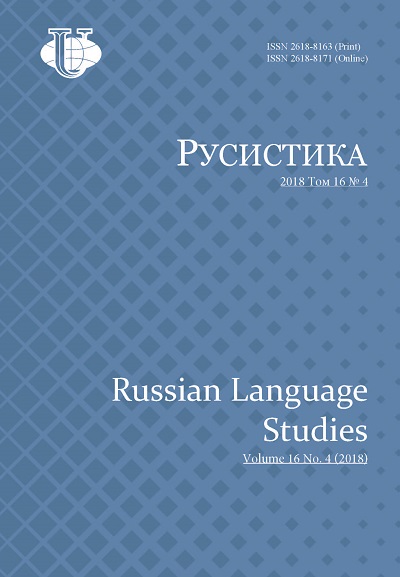The microfields of emotivity: language projections in Russian artistic texts
- Authors: Korostova S.V.1
-
Affiliations:
- Southern Federal University
- Issue: Vol 16, No 4 (2018)
- Pages: 412-427
- Section: Actual Problems of Russian Language Studies
- URL: https://journals.rudn.ru/russian-language-studies/article/view/20266
- DOI: https://doi.org/10.22363/2618-8163-2018-16-4-412-427
Cite item
Full Text
Abstract
The article deals with an actual issue of modern Russian philology - linguistic means representing the functional-semantic field of emotivity in Russian artistic texts. It identifies the specific verbalization of the fields of emotivity, as well as their interactions in the semantic structure of an artistic text. The zones of emotivity actualize emotive-evaluative meanings of a text - complex mental and sensual units in “author-interpreter” dialogical relationships. The principle of reversed perspective of feelings in an artistic text creates emotional empathy that broadens the personality of the interpreter. Emotional expectations of the interpreter are pre-determined by the development of the situation scenario which is considered normative from the point of view of collective linguistic consciousness. When the norm is abused, it produces the “effect of frustrated expectations” that forms the interpreter’s emotions. The novelty of the research lies in the fact that the emotive-evaluative meanings of Russian artistic text are analyzed in their integrity. The complex approach includes determining the representative and reactive qualities of the emotive units of the Russian language that create specific microfields in the structure of the functional-semantic field of emotivity. The emotional sphere is a part of the system of values in the mental world of a Russian language speaker, that is why there exists a variety of means used to express emotional-evaluative meanings, both emotional-affective and emotional-rational ones. Interaction of functional-semantic fields of personality, emotivity, evaluativeness, intensity helps determine the emotive dominant idea of a certain artistic text, find out how the means of expressing emotive-evaluative meanings correlate with the character of authorization of an artisitc text. The research of emotive fragments in the texts of Russian writers of the XIX-XXI centuries singled out typical components of the microfields of emotivity which are specific for the texts with different forms of narration.
About the authors
Svetlana Vladimirovna Korostova
Southern Federal University
Author for correspondence.
Email: svetolen@yandex.ru
PhD, Associate Professor of the Department of Russian Language of the Southern Federal University
105/42 Bolshaya Sadovaya St., Rostov-on-Don, 344006, Russian FederationReferences
- Balli, S. (1961). Frantsuzskaya stilistika [French Stylistics]. Moscow: Izd-vo inostrannoi literatury Publ. (In Russ.)
- Bakhtin, M.M. (1979). Estetika slovesnogo tvorchestva [The Aesthetics of Verbal Creativity]. Moscow: Iskusstvo Publ. (In Russ.)
- Goulman, D. (2009). Emotsionalnyi intellect [Emotional Intelligence]. Moscow: AST Publ.; Vladimir: VKT Publ. (In Russ.)
- Duren, Zh. (2002). O stereolingvistike. Kommunikativno-smyslovye parametry grammatiki i teksta [About Stereolinguistics. Communicative-Notional Parameters of Grammar and Text]. Moscow: Editorial UOSS Publ. (In Russ.)
- Zolotova, G.A., Onipenko, N.K. & Sidorova, M.Yu. (2004). Kommunikativnaya grammatika russkogo yazyka [Communicative Grammar of the Russian Language]. Moscow. (In Russ.)
- Kalimullina, L.A. (2003). K voprosu o yazykovoi differentsiatsii emotsii. II Mezhdunarodnye Boduenovskie chteniya: Kazanskaya lingvisticheskaya shkola: traditsii i sovremennost [To the Question of Linguistic Differentiation of Emotions. The Second International Readings of Boduen: Kazan Linguistic School: Traditions and Modernity]. Kazan: Izd-vo Kazan. un-ta Publ. (In Russ.)
- Kolshanskii, G.V. (1975). Sootnoshenie subjektivnykh i objektivnykh faktorov v yazyke [The Correlation of Subjective and Objective Factors in a Language]. Moscow: Nauka Publ. (In Russ.)
- Korostova, S.V. (2010). Pole emotivnosti: strukturno-semanticheskaya tipologiya mikropolei. Izvestiya JuFU. Filologicheskie nauki [The Field of Emotivity: Structural-Semantic Typology of the Microfields]. Rostov-on-Don. (In Russ.)
- Korostova, S.V. (2014). Emotivno-otsenochnye smysly v russkom khudozhestvennom tekste [EmotiveEvaluative Meanings in Russian Artistic text: monograph]. Rostov-on-Don: Yuzhnyi federal’nyi universitet Publ. (In Russ.)
- Korostova, S.V. (2015). K voprosu ob emotivnosti i emotsiogennosti russkogo khudozhestvennogo teksta. Filologiya i chelovek [To the Question of Emotivity and Emotiogeny of Russian Artistic Text. Philology and Man]. Barnaul: Altayskii gosudarstvennyi universitet Publ. (In Russ.)
- Melikyan, V.U. (2001). Dictionary: Emotional-Expressive Figures of Speech. Moscow: Flinta Publ.; Nauka Publ. (In Russ.)
- Nikitin, M.V. (1988). Osnovy lingvisticheskoi teorii znacheniya: ucheb. posobie [The Basics of the Linguistic Theory of Meaning: textbook]. Moscow: Vyssh. shkola Publ. (In Russ.)
- Noskova, S.E. (2006). Pragmatika diskursa malykh form [The Pragmatics of the Small Forms of Discourse]. Moscow—Tver’: Ija RAN Publ.; TvGU Publ.; TGSHA Publ. (In Russ.)
- Teliya, V.N. (1986). Konnotativnyi aspekt semantiki nominativnykh edinits [The Connotative Aspect of the Semantics of Nominative Units]. Moscow: Nauka Publ. (In Russ.)
- Toshovich, B. (2006). Ekspressivnyi sintaksis glagola russkogo i serbskogo/khorvatskogo yazykov [The Expressive Syntax of the Verb in Russian and Serbian/Croatian Languages]. Moscow: Yazyki slavyanskoi kul’tury Publ. (In Russ.)
- Shahovskii, V.I. (2008). Kategorizatsiya emotsii v leksiko-semanticheskoi sisteme yazyka [The Categorization of Emotions in the Lexical-Semantic System of the Language]. Mocow: LKI Publ. (In Russ.)
- Kovtunenko, I.V., Bylkova, S.V., Borisenko, V.A., Minakova, N.A. & Rogacheva, V.I. (2018). Interview as a Genre of New Media Communication: Rhetorical Relations and Pragmatic Effects. XLinguae. 11(2).















